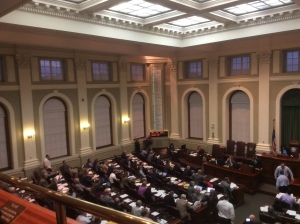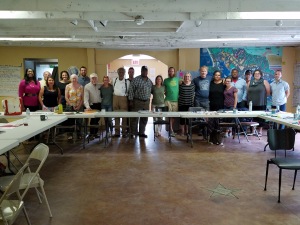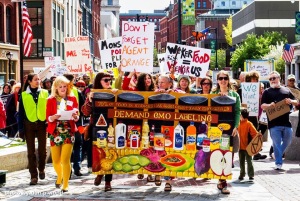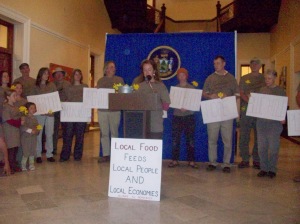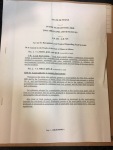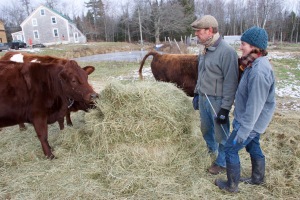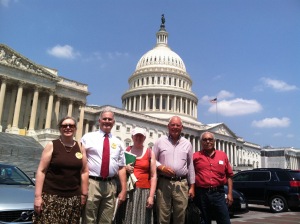So yesterday I spoke to a class at the University of Maine at Orono, The Anthropology of Food, a class taught by a wonderful young woman I met at the College of the Atlantic when I was on a panel down there for their Farm Day, Cynthia Isenhour. During her introduction she mentioned that this blog has a thousand followers! Wow, that many people are interested in what I have to say about politics and agriculture, who knew?
That piece of information made me feel a little guilty about my sporadic writing in this medium so I think I am obliged to drop you a post today. Here is the slide show and talk I gave to that class yesterday, enjoy:
Passing the Food Sovereignty law
 So in 2009 the inspector from the Maine Department of Agriculture, which had suddenly and internally changed their definition of milk distributors, walked down the wrong farm driveway. Two wrong driveways actually but that is the other part of the story. The Retbergs, Heather and Phil, had just built their farm business up enough that Phil could quit his off-farm job as a carpenter and they thought, with their dairy and their meat bird production, that they could make a go of it on their farm income. Supporting themselves and their three children while feeding their friends and neighbors good wholesome food. What they were told was that they could no longer share their farmer neighbor’s poultry slaughter facility and they would be classified as a milk distributor because they had a sign at the end of their driveway saying they sold raw milk.
So in 2009 the inspector from the Maine Department of Agriculture, which had suddenly and internally changed their definition of milk distributors, walked down the wrong farm driveway. Two wrong driveways actually but that is the other part of the story. The Retbergs, Heather and Phil, had just built their farm business up enough that Phil could quit his off-farm job as a carpenter and they thought, with their dairy and their meat bird production, that they could make a go of it on their farm income. Supporting themselves and their three children while feeding their friends and neighbors good wholesome food. What they were told was that they could no longer share their farmer neighbor’s poultry slaughter facility and they would be classified as a milk distributor because they had a sign at the end of their driveway saying they sold raw milk.
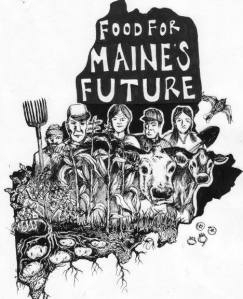
My small organization Food for Maine’s Future, then run by Bob St. Peter, met with the Retbergs (actually they were friends already and this speaks to the power of community which is such an integral part of the food sovereignty movement) and it was decided that grassroots action was going to be the most effective. They wrote and got passed in several surrounding towns the Local Food and Community Self-Governance Ordinance. This is a rights based ordinance founded on the Maine constitution’s Home Rule provision and on the work done by the water sovereignty activists in western Maine battling with Nestle to protect their ground water.
 Shortly after that the department of Ag decided to make a test case out of a guy, we called him Farmer Brown, milking one cow and selling it from his farm stand and at the farmer’s market in his town. The district court ruled against him, saying “milk is not food and therefore not covered by the Ordinance.” We took it all the way to the Maine Supreme Court who ruled against Dan but carefully avoided negating the Ordinance because they did not want to mess with the home-rule constitutional issue.
Shortly after that the department of Ag decided to make a test case out of a guy, we called him Farmer Brown, milking one cow and selling it from his farm stand and at the farmer’s market in his town. The district court ruled against him, saying “milk is not food and therefore not covered by the Ordinance.” We took it all the way to the Maine Supreme Court who ruled against Dan but carefully avoided negating the Ordinance because they did not want to mess with the home-rule constitutional issue.
 So all this time we were going to Augusta, trying to get the Ordinance applicable statewide. And failing. But attracting more and more attention for our work and more and more supporters. And we were increasing the number of towns which had passed the ordinance. Maine has a town meeting form of municipal governance and these ordinances were passing unanimously in these meetings. People get it. Neighbors feeding neighbors is not only good for the local economy but also good for healthy strong people and healthy strong communities. We kept getting our bills all the way to the governor’s desk but could not quite muster the votes to override his repeated vetoes. One victory we did have, early on, was getting the 1000 bird poultry slaughter exemption passed. More about meat later.
So all this time we were going to Augusta, trying to get the Ordinance applicable statewide. And failing. But attracting more and more attention for our work and more and more supporters. And we were increasing the number of towns which had passed the ordinance. Maine has a town meeting form of municipal governance and these ordinances were passing unanimously in these meetings. People get it. Neighbors feeding neighbors is not only good for the local economy but also good for healthy strong people and healthy strong communities. We kept getting our bills all the way to the governor’s desk but could not quite muster the votes to override his repeated vetoes. One victory we did have, early on, was getting the 1000 bird poultry slaughter exemption passed. More about meat later.
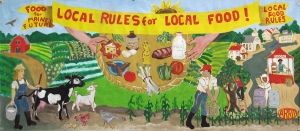 So once again we shifted strategies. We decided to pass a state constitutional amendment that stated people had the right to food of their choosing. A measure not subject to a gubenatorial veto. Now when we get these grandiose ideas we know we do not have the money to go up against the grocery manufacturers lobby or the dairy lobby head to head, dollar for dollar. Although we have had some good financial support most notably from Farm to Consumer Legal Defense Fund who finances our full time lobbyist (me) and from local co-operatives including Fedco Seeds we need people power to win. On the day of the vote we planned a rally. We even had Joel Salatin fly up to Maine to testify. Here he is with our lead ally and I can say one of the overall leaders in this movement Craig Hickman, farmer, legislator, all around great guy. And the other “wrong” driveway the department walked down in 2009. Craig and his husband Jop run a small farm and B&B in Winthrop and when the state inspectors told him he had to stop using his extra goats milk to make yogurt to sell in his farm stand his response was to run for the legislature.
So once again we shifted strategies. We decided to pass a state constitutional amendment that stated people had the right to food of their choosing. A measure not subject to a gubenatorial veto. Now when we get these grandiose ideas we know we do not have the money to go up against the grocery manufacturers lobby or the dairy lobby head to head, dollar for dollar. Although we have had some good financial support most notably from Farm to Consumer Legal Defense Fund who finances our full time lobbyist (me) and from local co-operatives including Fedco Seeds we need people power to win. On the day of the vote we planned a rally. We even had Joel Salatin fly up to Maine to testify. Here he is with our lead ally and I can say one of the overall leaders in this movement Craig Hickman, farmer, legislator, all around great guy. And the other “wrong” driveway the department walked down in 2009. Craig and his husband Jop run a small farm and B&B in Winthrop and when the state inspectors told him he had to stop using his extra goats milk to make yogurt to sell in his farm stand his response was to run for the legislature.
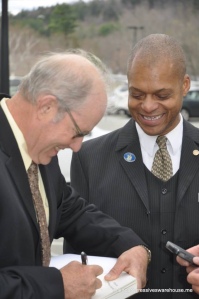 The real power we have is what I like to call “muddy boots in the halls of power”. We can’t turn out the numbers that the NRA does when there are gun bills getting heard at the capitol but we can turn out 100-200 people to testify on our big bills. In a state of 1.3 million people that can have an impact on our legislators. Plus we have those stalwart advocates in the legislature: Craig, Ralph Chapman, Troy Jackson, Michelle Dunphy, and a handful of republicans we can count on for votes and quiet support. And we were getting some national attention.
The real power we have is what I like to call “muddy boots in the halls of power”. We can’t turn out the numbers that the NRA does when there are gun bills getting heard at the capitol but we can turn out 100-200 people to testify on our big bills. In a state of 1.3 million people that can have an impact on our legislators. Plus we have those stalwart advocates in the legislature: Craig, Ralph Chapman, Troy Jackson, Michelle Dunphy, and a handful of republicans we can count on for votes and quiet support. And we were getting some national attention.
 We did not win this fight but it was only through the political manipulations of one of our chief foes in the state senate. I have to say it was a beautiful piece of political theatre that I had to admire, I could have enjoyed a lot more if I had not been on the losing side. In the house, however, we passed this on a recorded vote with the 2/3 majority we would have needed to get this on the ballot for the people of the state of Maine to decide. So we were not entirely discouraged.
We did not win this fight but it was only through the political manipulations of one of our chief foes in the state senate. I have to say it was a beautiful piece of political theatre that I had to admire, I could have enjoyed a lot more if I had not been on the losing side. In the house, however, we passed this on a recorded vote with the 2/3 majority we would have needed to get this on the ballot for the people of the state of Maine to decide. So we were not entirely discouraged.
 So we went back, This time with water allies. And this time we had a powerful ally whom we had converted from his previous skepticism about local food control. Senator Troy Jackson was back in the lege although no longer on the agriculture committee. This is a picture of the day we met with him and he offered to sponsor the bill. Niki and Heather were introduced to the folks in the revisor’s office and we wrote our own bill this time. We included local water control. Farmers can’t farm without water, after all. Unfortunately, we ended up having to remove water protection from the bill to get it out of committee but it was educational to see the number of suits that Nestles can turn out to testify against any bill that tries to stop their theft of water from the people of western Maine.
So we went back, This time with water allies. And this time we had a powerful ally whom we had converted from his previous skepticism about local food control. Senator Troy Jackson was back in the lege although no longer on the agriculture committee. This is a picture of the day we met with him and he offered to sponsor the bill. Niki and Heather were introduced to the folks in the revisor’s office and we wrote our own bill this time. We included local water control. Farmers can’t farm without water, after all. Unfortunately, we ended up having to remove water protection from the bill to get it out of committee but it was educational to see the number of suits that Nestles can turn out to testify against any bill that tries to stop their theft of water from the people of western Maine.
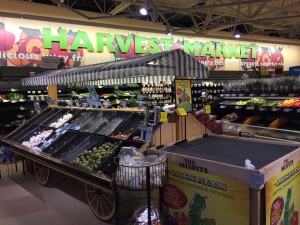 In this year’s session of the legislature. As we were preparing to reintroduce our statewide food sovereignty ordinance. This happened. I am not saying this had a big impact on our final outcome but the fact that a fire at a warehouse in southern Maine could lead to most of our major grocery stores in the state looking like this kind of was a wake up call for those who are paying attention to the fact that the food supply chain is fragile. People need to be able to feed themselves.
In this year’s session of the legislature. As we were preparing to reintroduce our statewide food sovereignty ordinance. This happened. I am not saying this had a big impact on our final outcome but the fact that a fire at a warehouse in southern Maine could lead to most of our major grocery stores in the state looking like this kind of was a wake up call for those who are paying attention to the fact that the food supply chain is fragile. People need to be able to feed themselves.
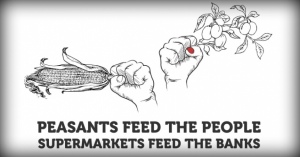 But we got the bill passed, unanimously in both houses. A bill that said essentially “if a town passes an ordinance to have control of their own food system the state will not interfere.” We were gearing up for a fight to override the expected veto from the governor when this happened. This is the signatures of our right wing obstreperous governor and his tea party ally senate president on our food sovereignty law. Victories are possible. It just takes persistence and being ready to defend the gains we make.
But we got the bill passed, unanimously in both houses. A bill that said essentially “if a town passes an ordinance to have control of their own food system the state will not interfere.” We were gearing up for a fight to override the expected veto from the governor when this happened. This is the signatures of our right wing obstreperous governor and his tea party ally senate president on our food sovereignty law. Victories are possible. It just takes persistence and being ready to defend the gains we make.
 But as a friend of mine likes to say. You get to the top of the mountain and you think you’ve made it and then the clouds part and there is the next higher peak you need to climb. We knew this was not going to be the end. We did not rest on our laurels. We have been busy organizing the 28 towns that have come to us since the passage of the law to get their own ordinance in place. We had been waiting for the other shoe to drop. Auburn became the first city to pass the ordinance with no assistance from us at all. It is part of the zeitgeist now. The ground swell is happening.
But as a friend of mine likes to say. You get to the top of the mountain and you think you’ve made it and then the clouds part and there is the next higher peak you need to climb. We knew this was not going to be the end. We did not rest on our laurels. We have been busy organizing the 28 towns that have come to us since the passage of the law to get their own ordinance in place. We had been waiting for the other shoe to drop. Auburn became the first city to pass the ordinance with no assistance from us at all. It is part of the zeitgeist now. The ground swell is happening.
Remember the national attention I told you about. Well this time it was the USDA. They are threatening to pull our state’s “permission” to state inspect meat and poultry processors and force them to have USDA inspectors unless the lege amends the law to exempt meat and poultry from local control. Based on the 1967 Wholesome Meat Act that put production of all red meat and poultry in the hands of the USDA at the behest of Big Ag. Leading to CAFOs. Maine runs its own meat and poultry processing program under a cooperative agreement with the feds. They were threatening to make us a “designated” state along with 48 other states.
The governor called the lege back into special session to deal with this. At the same time they dealt with Ranked Choice Voting and the marijuana legalization regulations. It was some interesting sausage making in that special session let me tell you.
 And as Heather says “when a bully wants your milk money and threatens you, what do you do? You stand up and fight back. But what do you do when he wants your milk money and threatens your friends?” As usual this is a divide and conquer mentality that works so well for the oligarchs so often and we strategized and conferred with our legislative allies and planned our next moves.
And as Heather says “when a bully wants your milk money and threatens you, what do you do? You stand up and fight back. But what do you do when he wants your milk money and threatens your friends?” As usual this is a divide and conquer mentality that works so well for the oligarchs so often and we strategized and conferred with our legislative allies and planned our next moves.
 We went back to the legislature, took our muddy boots back into the halls of power and with the help of our friends in the legislature we amended the law to suit the USDA and not totally gut the ordinance’s power. Here we are in the gallery of the House once again watching the vote. It was a good day. Made partially possible by the fact that we were really small potatoes in the special session. They used the USDA “emergency” as an excuse to call the special session on order to gut RCV and the marijuana legislation. The legislators were anxious to get us out of the way and start carving up the two things they really wanted to mess with RCV and marijuana. And the beat goes on.
We went back to the legislature, took our muddy boots back into the halls of power and with the help of our friends in the legislature we amended the law to suit the USDA and not totally gut the ordinance’s power. Here we are in the gallery of the House once again watching the vote. It was a good day. Made partially possible by the fact that we were really small potatoes in the special session. They used the USDA “emergency” as an excuse to call the special session on order to gut RCV and the marijuana legislation. The legislators were anxious to get us out of the way and start carving up the two things they really wanted to mess with RCV and marijuana. And the beat goes on.

